- Clone
- HMα2 (See other available formats)
- Regulatory Status
- RUO
- Other Names
- α2 integrin, VLA-2 α chain, Integrin α2 chain, ITGA2, HMa2
- Isotype
- Armenian Hamster IgG
- Ave. Rating
- Submit a Review
- Product Citations
- publications
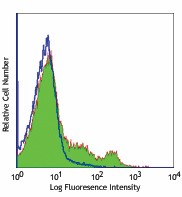
-

C57BL/6 mouse splenocytes stained with purified HMα2, followed by anti-Armenian hamster IgG FITC
| Cat # | Size | Price | Quantity Check Availability | Save | ||
|---|---|---|---|---|---|---|
| 103501 | 50 µg | 44€ | ||||
CD49b is a 150 kD glycoprotein, also known as α2 integrin, VLA-2 α chain, Integrin α2 chain, and HMα2. It is a member of the integrin family, expressed on NK cells, a subset of splenic CD4+ T cells, NK-T cells, intestinal intraepithelial and lamina propria lymphocytes, epithelial cells, and platelets. By associating with CD29 (integrin β1 subunit), CD49b forms the VLA-2 (integrin α2β1 ) complex. It plays a critical role in both adhesion and lymphocyte activation. The primary ligands for CD49b are collagen, laminin, and fibronectin. The HMα2 antibody has been shown to be useful for partially blocking CD49b mediated interactions with collagen. Additionally, this antibody blocks staining of splenic NK cells by the monoclonal antibody DX5.
Product DetailsProduct Details
- Verified Reactivity
- Mouse
- Antibody Type
- Monoclonal
- Host Species
- Armenian Hamster
- Immunogen
- Mouse colon carcinoma cell line Colon26
- Formulation
- Phosphate-buffered solution, pH 7.2, containing 0.09% sodium azide.
- Preparation
- The antibody was purified by affinity chromatography.
- Concentration
- 0.5 mg/ml
- Storage & Handling
- The antibody solution should be stored undiluted between 2°C and 8°C.
- Application
-
FC - Quality tested
IHC-F, IP, Block - Reported in the literature, not verified in house - Recommended Usage
-
Each lot of this antibody is quality control tested by immunofluorescent staining with flow cytometric analysis. For flow cytometric staining, the suggested use of this reagent is ≤ 0.25 µg per 106 cells in 100 µl volume. It is recommended that the reagent be titrated for optimal performance for each application.
- Application Notes
-
Additional reported applications (for the relevant formats) include: immunoprecipitation1, immunofluorescence on frozen sections4, and blocking of cell adhesion1-3. The Ultra-LEAF™ purified antibody (Endotoxin < 0.01 EU/μg, Azide-Free, 0.2 μm filtered) is recommended for functional assays (Cat. No. 103525 & 103526).
-
Application References
(PubMed link indicates BioLegend citation) -
- Miyake S, et al. 1994. Eur. J. Immunol. 24:2000. (Block, IP)
- Noto K, et al. 1995. Int. Immunol. 7:835. (Block)
- Arase H, et al. 2001. J. Immunol. 167:1141. (Block)
- Zhang Z, et al. 2008. Blood 111:1980. (IF)
- Product Citations
-
- RRID
-
AB_313024 (BioLegend Cat. No. 103501)
Antigen Details
- Structure
- Integrin family, associates with CD29 (β1 integrin), 150 kD
- Distribution
-
NK cells, subset splenic CD4+ T cells, NK-T cells, intestinal intraepithelial and lamina propria lymphocytes, epithelial cells, platelets
- Function
- Adhesion, lymphocyte activation
- Ligand/Receptor
- Collagen, laminin, fibronectin
- Cell Type
- Epithelial cells, Lymphocytes, NK cells, NKT cells, Platelets, T cells
- Biology Area
- Cell Adhesion, Cell Biology, Immunology, Innate Immunity
- Molecular Family
- Adhesion Molecules, CD Molecules
- Antigen References
-
1. Barclay AN, et al. 1997. The Leukocyte Antigen FactsBook Academic Press.
2. Sasaki K, et al. 2003. Int. Immunol. 15:701.
3. Inoue O, et al. 2003. J. Cell Biol. 160:769. - Gene ID
- 16398 View all products for this Gene ID
- UniProt
- View information about CD49b on UniProt.org
Related FAQs
Other Formats
View All CD49b Reagents Request Custom Conjugation| Description | Clone | Applications |
|---|---|---|
| FITC anti-mouse CD49b | HMα2 | FC |
| PE anti-mouse CD49b | HMα2 | FC |
| Purified anti-mouse CD49b | HMα2 | FC,IHC-F,IP,Block |
| Alexa Fluor® 488 anti-mouse CD49b | HMα2 | FC |
| Alexa Fluor® 647 anti-mouse CD49b | HMα2 | FC |
| Purified anti-mouse CD49b (Maxpar® Ready) | HMα2 | FC,CyTOF® |
| APC anti-mouse CD49b | HMα2 | FC |
| PE/Cyanine7 anti-mouse CD49b | HMα2 | FC |
| PerCP/Cyanine5.5 anti-mouse CD49b | HMα2 | FC |
| Biotin anti-mouse CD49b | HMα2 | FC |
| TotalSeq™-A0421 anti-mouse CD49b | HMα2 | PG |
| TotalSeq™-C0421 anti-mouse CD49b | HMα2 | PG |
| Ultra-LEAF™ Purified anti-mouse CD49b | HMα2 | FC,IHC-F,IP,Block |
| TotalSeq™-B0421 anti-mouse CD49b | HMα2 | PG |
Customers Also Purchased
Compare Data Across All Formats
This data display is provided for general comparisons between formats.
Your actual data may vary due to variations in samples, target cells, instruments and their settings, staining conditions, and other factors.
If you need assistance with selecting the best format contact our expert technical support team.
-
FITC anti-mouse CD49b
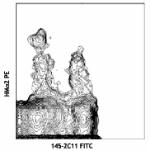
C57BL/6 splenocytes stained with HMα2 PE and 145-2C11 FITC -
PE anti-mouse CD49b

C57BL/6 splenocytes stained with HMα2 PE and 145-2C11 FITC -
Purified anti-mouse CD49b
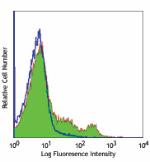
C57BL/6 mouse splenocytes stained with purified HMα2, follow... -
Alexa Fluor® 488 anti-mouse CD49b
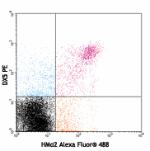
C57BL/6 mouse splenocytes stained with HMα2 Alexa Fluor® 488... -
Alexa Fluor® 647 anti-mouse CD49b
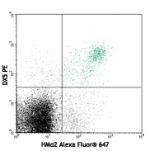
C57BL/6 mouse splenocytes stained with HMα2 Alexa Fluor® 647... -
Purified anti-mouse CD49b (Maxpar® Ready)
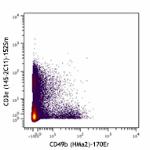
C57BL/6 mouse splenocytes stained with 152Sm-anti-CD3e (145-... -
APC anti-mouse CD49b
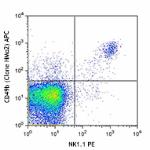
C57BL/6 splenocytes were stained with NK1.1 PE and CD49b (cl... 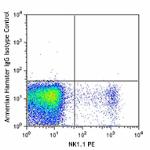
-
PE/Cyanine7 anti-mouse CD49b

C57BL/6 splenocytes were stained with NK1.1 APC and CD49b (c... -
PerCP/Cyanine5.5 anti-mouse CD49b

C57BL/6 splenocytes were stained with NK-1.1 APC and CD49b (... -
Biotin anti-mouse CD49b
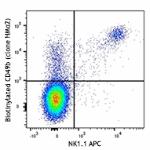
C57BL/6 splenocytes were stained with NK1.1 APC and biotinyl... 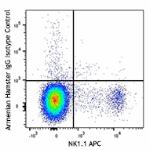
-
TotalSeq™-A0421 anti-mouse CD49b
-
TotalSeq™-C0421 anti-mouse CD49b
-
Ultra-LEAF™ Purified anti-mouse CD49b
-
TotalSeq™-B0421 anti-mouse CD49b
 Login / Register
Login / Register 







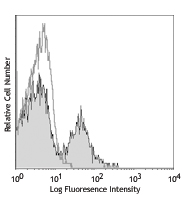
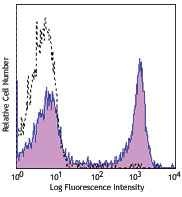
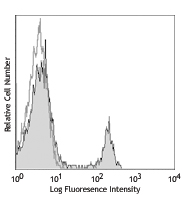



Follow Us